Salvage Title Car: Should I Avoid Them?
June 30, 2021
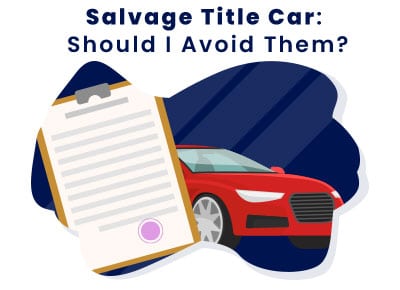

I am a serial entrepreneur and a consumer advocate. When I’m not helping car buyers, I love working on ventures that have a positive impact.
I run a cause marketing agency and serve on the board of Vayu Global Health where we are disrupting the medical industry and preventing the needless deaths of mothers and babies during childbirth.
If you are looking for a bargain when it comes to used vehicles, then you may have heard of salvage title car vehicles.
At first, the thought of purchasing a salvage title car doesn’t sound like an attractive idea. However, you may find some opportunities from these generally unwanted vehicles.
Here’s a look at what a salvage title car is and if you should avoid them.
Which option is right for you? Buying a new car or a used car.
- Get a fair price for your car no matter the condition (totaled, flooded, scrap, etc.)
- Instant cash offer, good for 7 days
- Free towing and you'll avoid typical junk removal fees
- Sell your vehicle without leaving your home.
Table of Contents
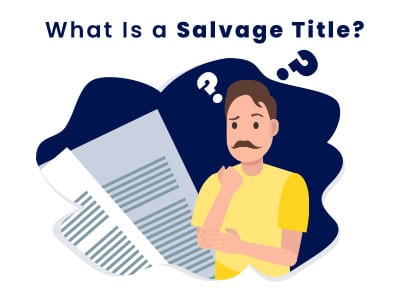
What Is a Salvage Title?
A salvage title car is a vehicle that has usually been in an accident and has been declared a total loss by an insurance company. At that point, the insurance company will take possession of the vehicle and will attempt to resell it in an attempt to recoup its cost.
When the vehicle is placed for sale or auction, the vehicle will have a salvage title indicating that the vehicle has experienced some type of damage.
Can You Get Rid of the Salvage Title on a Car?
In order to get rid of the salvage title on a car, you will need to purchase the vehicle and have it repaired. Afterward, you will need to have the vehicle inspected and file the proper paperwork. At this point, a salvage title car can receive a rebuilt or reconstructed title.
Be sure to check your state law. Some states may not allow a salvage title car to have any other title.
Types of Car Damage
Not all salvage vehicles are the same. Some of these salvage vehicles have undergone different types of damage. Here’s a look at the types of car damage experienced by a vehicle with a salvage title.
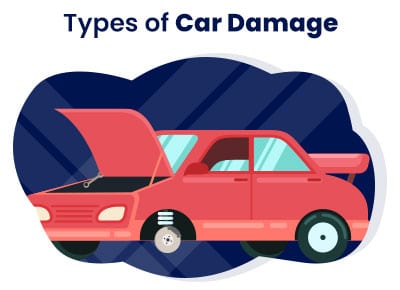 Accident - The vehicle has been in an accident, and the cost of the accident damage exceeded the vehicle's value.
Accident - The vehicle has been in an accident, and the cost of the accident damage exceeded the vehicle's value.- Flood - The vehicle has been involved in a flood. In many cases, a flooded vehicle will be declared a total loss.
- Fire - The vehicle has been involved in a fire that will result in damage to the vehicle that exceeds its value.
- Hail - The vehicle has received hail damage that exceeds the value of the vehicle.
- Theft - The vehicle was involved in a theft that led to the loss of vehicle parts.
- Heavy Use - The vehicle was used as a livery or a police vehicle, and its excessive mileage results in a salvage title.
Salvage Title Cars: Pros
You may be surprised to know that there are actually some benefits to purchasing a salvage title car. Here’s a look at circumstances where you may want to consider purchasing a vehicle with a salvage title:
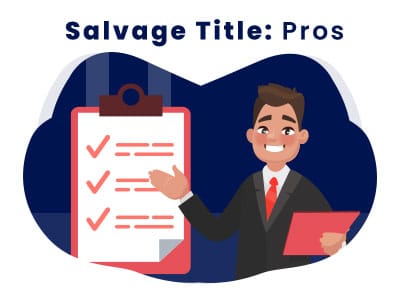
- You Are Purchasing the Vehicle for Parts - If you are looking for specific parts from a specific vehicle. You may want to consider purchasing a salvage vehicle that may not have damage to the parts that you need.
- You Believe the Damage Is Fixable - If you are handy with vehicle repair, you may know how to fix a salvage vehicle that could make it a bargain.
- You Can Save Money - Some salvage vehicles are still drivable. If you find the right salvage vehicle, you will be able to save a significant amount of money.
Salvage Title Cars: Cons
While there are benefits to purchasing a salvage title car under certain circumstances, there are many reasons why you may not want to consider purchasing a salvage title car. Here’s why you may want to steer clear of these vehicles:
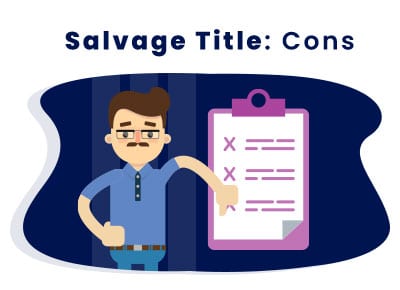
- High Insurance Rates - Some insurance companies will not insure a salvage title car, while others may charge an excessively high amount.
- Hard to Finance - Some lenders are reluctant to finance a salvage vehicle because they may not have the complete history of the vehicle.
- Harder to Resell - Many vehicle buyers and dealerships will be reluctant to purchase a vehicle with a salvage title because of the unclear vehicle history and the vehicle damage.
How to Buy a Salvage Title Car
If you are interested in purchasing a salvage title car, it is important to know what you are looking for. Here are some steps to help you make the right choice when you buy a salvage title car:
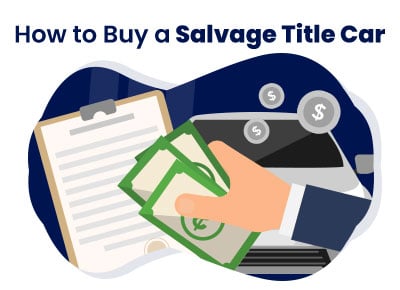
- What to Ask For - You should ask what damage made the car a salvage. From there, you have to decide how much it will cost to repair the vehicle. At this point, you may want to consider getting a pre-inspection performed on the vehicle. After that, you have to consider whether you will repair the vehicle yourself versus having the work completed by a mechanic.
- How to Tell if the Car Has a Salvage Title - You can perform a VINCheck from the NICB (National insurance Claim Bureau). The VINCheck will tell you what type of title the vehicle currently holds.
- Where to Buy a Salvage Car - The best place to purchase a salvage car would be a car auction. Here are the top five places where people purchase salvage vehicles: Copart, ACV Auctions, IAAI, Auto Auction Mall, and AutobBidMaster.
Should I Buy a Salvage Title Car?
There are some cases where it may be a smart idea to purchase a salvage title car. Here are the circumstances where purchasing a salvage title car may be right for you:
- You know what’s wrong with the vehicle and how to repair it.
- You are purchasing the vehicle for parts.
- The vehicle is still drivable and priced at a significant discount.
Salvage Title Car Alternatives
If a salvage title car sounds too risky, here are some alternatives for a discounted vehicle:
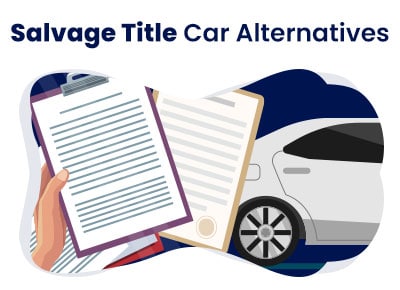 Repo Cars - A repo car or a repossession car is a vehicle that has been repossessed by a dealership or a lender when the vehicle owner fails to make the payments for the vehicle.
Repo Cars - A repo car or a repossession car is a vehicle that has been repossessed by a dealership or a lender when the vehicle owner fails to make the payments for the vehicle.- Demo Cars - Demo cars are what dealerships use for test drives, or sometimes the dealership's management uses for commuting.
- Beater Cars - Beater cars are older, high-mileage vehicles that still run well.
- Rental Cars - To keep their fleets up to date, rental companies buy new vehicles and sell their old ones.
- Auction Cars - Often, the vehicles that come from the private auction dealers are in good condition.
- CPO Vehicles - Certified pre-owned vehicles are used cars that are certified by the manufacturer.
Best Car Deals by Category
Frequently Asked Questions
How do I tell if a title is clean or salvage?
You can search for any car title using a VINCheck from the NICB (National Insurance Claim Bureau). VINCheck is a free service.
How much does a salvage title reduce the vehicle’s value?
According to Kelly Blue Book, a salvage title can reduce the value of a vehicle anywhere from 20% to 40% versus the same make and model with a clean car title.
Can you get insurance on a salvage title car?
Some states will not insure a vehicle with a salvage title car. Therefore it is important to check the state laws regarding salvage title cars. Additionally, some insurers will only provide liability insurance for a salvage title car.
Can you get financing on a salvage title car?
There are not that many lenders who will provide financing for a salvage title car. Therefore, in most cases, you will be purchasing a salvage title car at auction, which means that you will be paying in cash for the vehicle.
Can a salvage title get a clean title again?
No. Once a vehicle has a salvage title, it can never receive a clean title again.
What is title washing?
Title washing is an illegal practice common in the world of used vehicles that have had significant damage. Title washing refers to the practice of removing information about a vehicle that has lowered its value. One of the most common ways title washing occurs is by moving the vehicle from one state to the next. In other cases, the seller makes physical alterations to the vehicle’s title.
How can I avoid a vehicle that has undergone title washing?
One of the most effective ways to verify a vehicle’s history is to get a CARFAX vehicle history report. With a CARFAX history report, you’ll be able to get information about the vehicle’s title along with its ownership history, mileage, accident, and service history.
Posted in Car Buying Tips |





